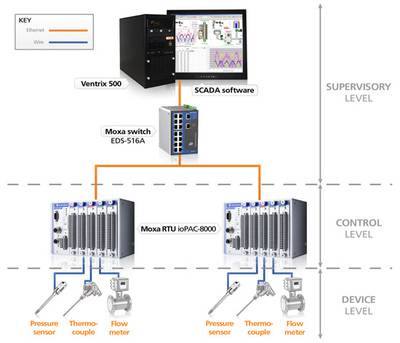What is SCADA?
SCADA (Supervisory Control And Data Acquisition) refers to industrial control systems that monitor and control industrial infrastructure or facility processes such as power generation, oil & gas production, water/waste-water treatments, wind farms, large communication systems, building management systems and transportation systems.
 A typical SCADA system comprises of Human Machine Interface (HMI), Remote Terminal Unit (RTU) or Programmable Automation Controller (PAC), supervisory computer system, Network infrastructures connecting the supervisory system to the Remote Terminal Units and various process instrumentation.
A typical SCADA system comprises of Human Machine Interface (HMI), Remote Terminal Unit (RTU) or Programmable Automation Controller (PAC), supervisory computer system, Network infrastructures connecting the supervisory system to the Remote Terminal Units and various process instrumentation.
SCADA systems are used to perform data acquisition and control at the supervisory level; HMI's are typically depicted as local user interfaces that permit process engineers to manipulate the process locally and perform SCADA programming work to customise the system.
Data Acquisition begins at the RTU or PLC level which involves parameter readings by sensors that are transmitted to the SCADA supervisory system. The data is then compiled and formatted in such a way that a control room operator using an interface terminal (HMI) can make appropriate supervisory decisions that may be required to adjust or override normal PLC controls. SCADA systems also allow operators to change the settings as appropriate at the level of the RTU or the central station. Alarming conditions like high temperature can then be recorded and displayed.
Programmable Automation Controller (PAC) is a compact controller that combines the features and capabilities of a PC-based control system with that of a typical PLC. PACs can be deployed in SCADA systems to replace the RTU or PLC functionality.
SCADA System benefits:
A well designed SCADA system saves time and money by eliminating the need for service engineers to visit each site for inspection and data collection/logging. Further SCADA system benefits are as follows:
- Increases productivity and profitability.
- Wear and tear on equipment can be reduced by continuously monitoring levels.
- The number of man-hours for troubleshooting and/or maintenance can be drastically reduced.
- Operating costs can be reduced and greater ROI (return on investment) can be achieved by using a PAC-based SCADA system compared to a proprietary system.
- Expensive service calls by repair engineers/technicians can be eliminated.
- The number of customer complaints/inquiries can be drastically reduced, for example: incoming calls concerning low pressure or poor water quality in water systems.
- Operators can see real-time system trouble.
Amplicon have a vast range of SCADA systems and solutions including SCADA software, HMI, Industrial PC, network infrastructures, Remote Terminal Units (RTUs) and Programmable Automation Controllers (PACs).